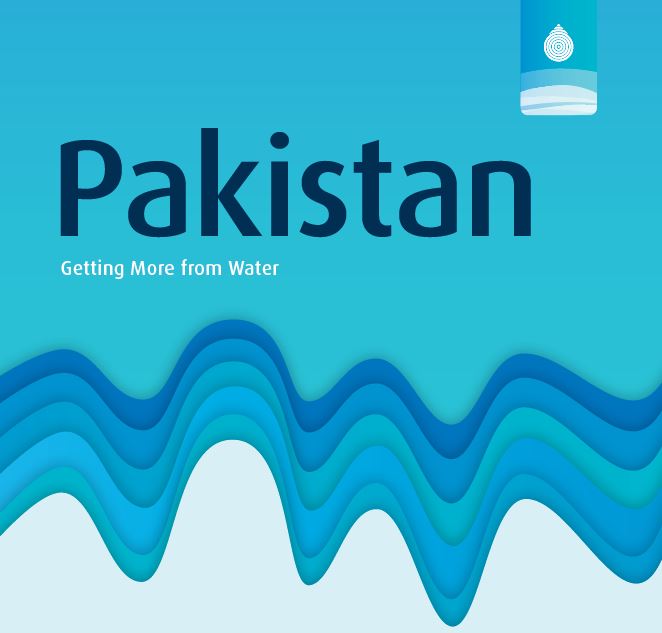Pakistan: Getting More from Water
This report was prepared by a World Bank team led by William Young with contributions from William Garthwaite III, Michael Gilmont, Christina Leb, Lucy Lytton, and Basharat Saeed. The report is based upon work commissioned from the International Water Management Institute (IWMI) with economic modeling undertaken by the International Food Policy Research Institute (IFPRI). Key contributors to the commissioned work were Arif Anwar (IWMI), Stephen Davies (IFPRI), Edoardo Borgomeo (IWMI), Ian Makin (IWMI), and Tousif Bhatti (IWMI). Important early guidance for this work was provided by Claudia Sadoff while with the World Bank Water Global Practice (Water GP); her support and oversight of the IWMI team in her current role as IWMI Director General is also greatly appreciated. For technical guidance, including through formal peer reviews and many engaging discussions, the team thanks Greg Browder, Richard Damania, Maitreyi Das, Johannes Jansen, Winston Yu (IWMI), Ghazala Mansuri, Hanan Jacoby, Maximillian Hirn, Rikard Liden, Shiva Maki, Toru Konishi, and Mohammad Farhan Sami. For wise counsel, encouragement, and support, the team thanks Michael Haney (SAR Practice Manager, Water GP), Jennifer Sara (Senior Director, Water GP), Guang Zhe Chen (Former Senior Director, Water GP), Illango Patchamuthu (Country Director, Pakistan), Melinda Good (Operations Manager, Pakistan), Lixin Gu (Sustainable Development Program Leader, Pakistan), Alex Ferguson (Senior Manager, SAR External Communications), Mariam Altaf (Communications Officer, SAR External Communications), Huma Zafar (Operations Officer, Pakistan), and Fei Deng (Country Program Coordinator, Pakistan). Valuable consultations—both formal and informal, in-country and internationally—helped to frame this work and shape the ideas and messages that have emerged from the analysis. For positive influence and wide-ranging insights, thanks are due to Ali Sheikh and Hina Lotia (LEAD Pakistan); William Doan (U.S. Army Corps of Engineers); Uzma Khan and Rhiannon Bramer (U.S. State Department); Sohail Naqvi and Hammad Khan (World Wildlife Fund [WWF] Pakistan); Simi Kamal and Zohair Ashir (Hisaar Foundation); Sonia Amir (The Asia Foundation); Zaigham Habib (hydrologist); Rafay Alam (environmental lawyer); Peter Wallbrink, Mobin Ahmed, and Mac Kirby (Commonwealth Scientific and Industrial Research Organisation [CSIRO] Australia); Undala Alam (Department for International Development [DFID] U.K.); and Brek Batley, David Preston, and Hamza Khalid (Department of Foreign Affairs and Trade [DFAT], Australia. In addition, interactions with many generous and insightful people across multiple government agencies and organizations at federal, provincial, and municipal levels have positively influenced this work. This work was financed through the Global Water Security and Sanitation Partnership (GWSP). GWSP is a multidonor trust fund administered by the World Bank’s Water GP and supported by DFAT; the Bill and Melinda Gates Foundation; The Netherlands’ Ministry of Foreign Trade and Development Cooperation; Norway’s Ministry of Foreign Affairs; the Swedish International Development Cooperation Agency; Switzerland’s State Secretariat for Economic Affairs; the Swiss Agency for Development and Cooperation; the Rockefeller Foundation; and the U.K. Department for International Development (DFID). Within the World Bank the team thanks Maria Angelica Sotomayor, Joel Kolker, Craig Kullmann, and Ai Ju Huang for GWSP assistance. This work is part of a growing suite of water security studies across the World Bank Water GP. Many World Bank colleagues have helped develop the concepts and frameworks used in this study, including Greg Browder, Anders Jägerskog, and Irene Rehberger Bescos. Efficient administrative support was provided by many, including Lucson Pierre-Charles and Georgine Badou from the Water GP in Washington, D.C., and many dedicated professionals in the Pakistan Country Management Unit in Islamabad.
